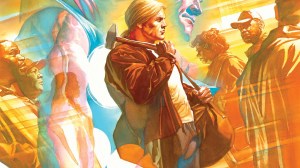Articles
Thor Comics Aren’t Superhero Stories, They’re Actually Horror

Marvel’s Thor Odinson, aka the God of Thunder, is one of their most iconic superheroes, possibly of all time. He’s a heavy-hitting hero hailing from Asgard, and he has saved the day on countless occasions. He is a hero of his people, a savior of Earth, and a regular occurrence among the Avengers. As such, it’s probably natural to assume that all of Thor’s stories are founded on the superhero premise. However, a closer inspection of the common themes running through Thor’s tales makes something very apparent. Thor’s stories are founded in horror, not superheroism. More specifically, his world, adventures, and plights are often deeply rooted in cosmic horror.
Cosmic horror, which is sometimes called Lovecraftian horror or cosmic dread, is a subgenre of horror. It’s famous for emphasizing the insignificance of humanity, highlighting the minuscule scale against which humanity (and humanoids) have to bear against the face of the cosmos. Since Thor is a literal god, it may be hard to see how he fits into that picture, but we promise we’ll explain everything.
In general, there are a few key elements of cosmic horror one should try to keep in mind. First, that the universe is vast and cold. Second, some things cannot be understood, and striving to understand those things can come at a hefty price. Third, humanity is fragile and often insignificant. Other key elements include hopelessness, alien entities, psychological deterioration, isolation, blurred reality, and forbidden knowledge.
Entities Beyond Our Understanding

Thor’s comics are often full of creatures and entities that feel larger than life. This makes sense, as any threat to Thor must, naturally, but significantly more terrifying than what humanity can create (usually). As such, Thor has gone up against Elder Gods, Celestials, and even more abstract cosmic beings.
Thor has faced many enemies in his long life, but none pushed him to the limit the way Gorr the God Butcher did. We’ll talk more about Gorr’s premise in the next section; right now, we need to focus on his army. Gorr brought an army of living darkness against Thor (Thor: God of Thunder #5). These minions dragged Thor across space and time in an attempt to isolate and enslave him. Naturally, Thor escaped this timeline, but only with the help of his future granddaughters and the future version of himself.
Facing Cosmic Indifference

Cosmic indifference is another recurring theme in Thor’s comics. Think about it, many of the larger entities in Marvel are ambivalent at best, deeply malicious at worst. The Celestials are these all-powerful cosmic beings that show up to judge or experiment on lower life-forms. They may have created the Eternals, but everyone up-to-date on their lore knows how that is more of a bad thing than a positive.
Galactus may not be a villain solely dedicated to Thor, but his presence is another solid example of this. Galactic has little concern about gods or mortals, and even the likes of Thor appear tiny in comparison. Donny Cates’ early run of Thor put the Odinson as the Herald of Galactus, which really helps to drive that point home.
Remember how we mentioned Gorr the God Butcher? Gorr’s backstory is a harrowing reminder that in Thor’s universe, many people have come to rely on gods. Gods like Thor. As such, when these people are overlooked and abandoned, they may suffer or seek revenge.
Forbidden Knowledge

Forbidden knowledge is a fairly common theme in Norse mythology, so naturally, it bleeds into Thor’s comics. While his brother, Loki, may be infamous for seeking out everything he has been told to avoid, Thor himself has crossed paths with forbidden knowledge on many occasions. This is especially true in recent years, in which Marvel has forced Thor to take a good, hard look at Asgard and what it represents. He has learned the truth about his father, his heritage, his people, and even the secrets of the gods. Thor has even looked into the future to see different versions of himself, not to mention a version of his own death.
Existential Dread

Thor is no stranger to existential dread. Every day, he has the same question: Am I worthy? He relies on Mjolnir to answer that question for him, and Marvel has highlighted Thor’s hesitation a few times. Likewise, Thor has lost what makes him worthy. When he became Unworthy Thor, readers saw a version of Thor stripped down to the bones, forced to build himself from the ground up. The whole premise of Unworthy Thor is built on Gorr’s foundation. He left a seed of doubt in Odinson, making him question everything the gods stand for.
Conversely, King Thor portrays a very different side of Thor’s existential dread. This version of Thor outlived most of his friends, family, and allies. Even his enemies. He’s facing down the barrel at the heat death of the universe, the end of every living thing in the universe. How is that anything other than the embodiment of pure existential dread?
What do you think? Let us know in the comments!
The post Thor Comics Aren’t Superhero Stories, They’re Actually Horror appeared first on ComicBook.com.




